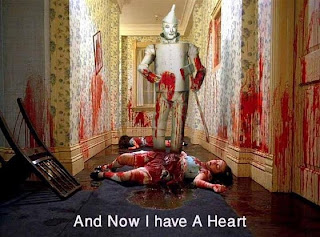To be
'senior' in High School may be understood as false. Focus on what one is going
to be takes precedence over who one actually is. At any age. A future, how to
develop one's potential, to best the interview, to get ahead, and how to prove
one's worth predominates. Yet while in Grades Ten, Eleven and Twelve (that
freeing grade that declares the end of the dependence plateau from which we, in
a formal ceremony, leap into the insecurities of self-reliance) there is a
generalized gelling of the fundamentals of being one's 'self' that gets firmed
by comparisons, judgements, and one's habituations.
Some
Senior Highs have Grade Nine through Thirteen. We are apportioned according to
the culture. We are grouped according to age. We are ranked according to
ability. We are graded accorded to product. We are befriended according to
circumstance or the chance of similarities observed, stated, or implied. And we
are supported most unfairly based on the opinions and grades given by parents,
family, teachers, friends. Penelope hates Miss X and Mr. Y, but Percy likes
both of them. Penelope loves Percy, she thinks, but Percy is sure he doesn't
like her. And as such, adults or still youngsters, we Gods in Senior High, at
any age, keep extending and retracting and advancing and withholding the many
gradations of our concepts, our intentions, our values and morals and ethics.
Accretion of our accomplishments or of awards or of wealth or even of focus and
purpose and direction entrenches our growing resume of character, serves to
augment our personality, and sets us up to be autonomously accountable, though
we may continue to reach perpetually for our support systems. It is judgement
and grades that easily continues to divide us. How else can Penelope vie for
Medical School? How else does Percy hope to get into Oxford? And commercialism,
that necessary commodity of the commune between all sentient creatures, becomes
the altar to which most of us are drawn, albeit ineluctably or not, since we
deem those with 'more' to have more value as a human being, more power, more
prestige, more worth; despicable of character or royal by pronouncement.
Attitudes predominate. We are clearly conscious of variables, and rather than
integration and compassion and acceptance and tolerance and inclusion,
generally and collectively, we are concerned with ensuring that we ourselves
get ahead. Even as a Group, whether with grades or on the sports field, we hope
to kick butt. Or the individual does not care, and the apathetic, the
iconoclast, the rebel, the underachiever, the non-complaint, the selfish, the
arrogant, the... The differentiation becomes more marked. One develops or
experiments with fields of sameness; the school has clubs for the gays
(nowadays), the smokers, the Mormons, the Jews. And we even may accept or
rejoice or grumble that no longer do we say the Lords' Prayer. Groups will
parade and promulgate and litter the walls with posters of their contentions.
Many individuals will sublimate and hide and work alone and think what they
think, but being in the school's Collective Memes, albeit unwittingly, is
hardly one's own fault. The grades of our apportionment prior to graduating
toward true autonomy (into a yet more complex society,) is due to our
enculturation and others' legal and societal and familial expectations. Even
our friends and teachers are there to urge at us: Stay with us now!
Recognizing
ourselves in life's perpetual curriculum, as adults, is not lightly seen. Our
consciousness of the grades given to each other, if not to ourselves
perpetuates the stress of comparisons, the business of checking out the Jones,
and of attachment to values. Gods' grades may be suspect, but they can become
stepping stones to more.
















